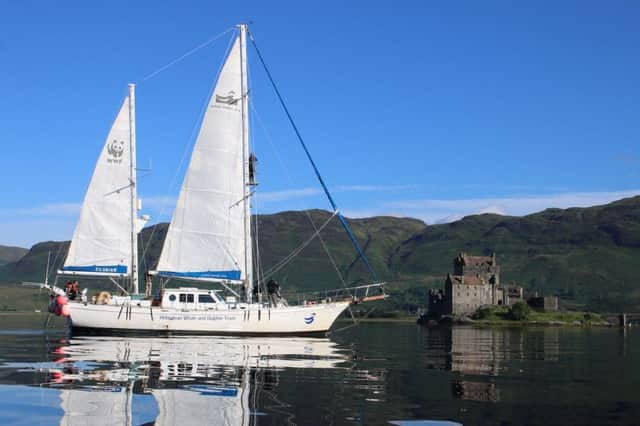Conservationists urge action to safeguard Scottish sea life


WWF Scotland, the Hebridean Whale and Dolphin Trust (HWDT) and a leading marine research scientist are calling on the Scottish Government to complete the network of Marine Protected Areas (MPAs) to safeguard the delicate ecosystems and habitats.
Conservationists said well-managed MPAs not only protect sea life and help conserve Scotland’s rich biodiversity, but can also help tackle climate change and support the development of sustainable fisheries by protecting breeding habitats.
Advertisement
Hide AdAdvertisement
Hide AdWWF Scotland marine policy officer Esther Brooker said: “While acknowledging the good work that has already been carried out since the Marine Act was passed in 2010, we now believe the final pieces of the MPA jigsaw must be put in place to complete the network.
“This means delivery of crucial measures to manage damaging activities in existing MPAs and designation of more sites for species not currently covered in the network.
“By doing so, the Scottish Government will not only be safeguarding iconic species such as the charismatic, but much declined, harbour seal and life-giving habitats such as seagrass, they will also be protecting the thousands of jobs that rely on us having healthy seas.
“By completing and effectively managing the MPA network during 2018, the Scottish Government will ensure the jewels of Scotland’s seas are there for future generations to enjoy and will provide some clarity in uncertain times for our fishing industry.”
Alison Lomax, director at HWDT, said: “HWDT has been collecting data on whales, dolphins, porpoises and basking sharks on the west coast of Scotland for over two decades.
“The evidence exists to support the designation of the remaining MPAs and protect important feeding and breeding grounds for these charismatic animals.
“With increasing pressure from human activity and the effects of climate change, we need to act now.”
Dr Charlotte Hopkins, a marine research scientist from the University of Glasgow, said: “The oceans are facing unprecedented threats from plastic pollution, overexploitation and the impacts of climate change.
Advertisement
Hide AdAdvertisement
Hide Ad“MPAs alone will not solve these global challenges. However, when effectively managed to reduce human pressures they are a crucial component in maintaining healthy marine ecosystems.”
The Scottish Government said its Programme for Government contains a range of actions to improve the status of the marine environment.
A spokesman said: “We are undertaking a review of the national marine plan, working to improve the protection of priority marine features and progressing delivery of management measures for existing Marine Protected Areas.
“We are not limiting our efforts to MPAs and developing a conservation strategy for wide-ranging dolphin and porpoise species.
“We are implementing our marine litter strategy and tackling the issue of ocean plastics and aiming to introduce a deposit return scheme to encourage recycling, considering how to reduce the demand for single-use products such as coffee-cups and have also pledged funds to help address the issue of litter sink areas around our coastline.”